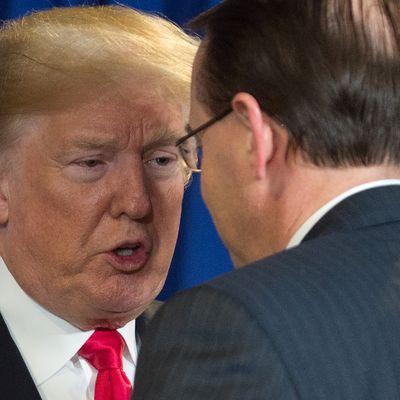
If you’re looking for evidence that President Trump may have obstructed justice, there are around two dozen different incidents to choose from. Even if we focus just on Trump’s dismissal of FBI director James Comey, we have:
• Trump repeatedly asking Comey to say he wasn’t a target in the Russia probe.
• Trump’s “angry, meandering” four-page letter, which was never sent, in which he reportedly said Comey should be fired for failing to announce he wasn’t personally targeted in the Russia investigation.
• The firing itself, which the White House said was based on the recommendation of Deputy Attorney General Rod Rosenstein. (Prosecutors could argue that eliciting help from others in concocting a false cover story shows Trump was acting with corrupt intent.)
• Trump telling Russian officials: “I just fired the head of the FBI. He was crazy, a real nut job. I faced great pressure because of Russia. That’s taken off.”
• Trump saying in a televised interview that he fired Comey because he was thinking, “You know, this Russia thing with Trump and Russia is a made-up story.”
Now there’s another, dizzying addition to the list. The New York Times reports that former FBI deputy director Andy McCabe (who had his own issues with Trump) wrote a memo last spring in which he recalled a conversation with Rosenstein in the days after Comey’s firing. Per the Times:
But in the meeting at the Justice Department, Mr. Rosenstein added a new detail: He said the president had originally asked him to reference Russia in his memo, the people familiar with the conversation said. Mr. Rosenstein did not elaborate on what Mr. Trump had wanted him to say.
To Mr. McCabe, that seemed like possible evidence that Mr. Comey’s firing was actually related to the F.B.I.’s investigation into the Trump campaign’s ties to Russia, and that Mr. Rosenstein helped provide a cover story by writing about the Clinton investigation.
One person briefed on Rosenstein’s conversation with the president told the paper that Trump wanted the deputy AG to mention that he wasn’t personally under investigation in the Russia probe. Instead, Rosenstein’s justification for Comey’s firing focused exclusively on his handling of the Clinton email probe. That may explain why Trump’s letter announcing the dismissal included a reference to Comey “informing me, on three separate occasions, that I am not under investigation.”
Like Comey, McCabe has reportedly given Special Counsel Robert Mueller several memos describing his conversations related to the president. He also turned over a copy of Trump’s unsent letter, which he obtained from Rosenstein.
Trump and his allies have previously suggested that Rosenstein should have recused himself from the Russia probe due to his role in Comey’s firing. However, Rosenstein has reportedly consulted with DOJ ethics advisers, who told him he doesn’t need to step aside. Rosenstein also said he talked to Mueller, and “if anything that I did winds up being relevant to his investigation” then he’ll recuse himself.
Trump’s “spygate” offensive has been losing steam in recent days, with House Oversight Chairman Trey Gowdy and even some Fox News personalities pouring cold water on the idea that the “deep state” embedded a spy in the Trump campaign for political purposes. Some have suggested that the Trump camp leaked the details of McCabe’s memos in an attempt to further discredit Rosenstein, and the FBI in general.
If true, Trump is scraping the bottom of the barrel. There are ways to justify the deputy AG’s recusal from the Russia probe, or even his firing, that don’t involve Trump accusing Rosenstein of covering up his own attempt to obstruct justice.






























